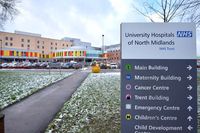NHS launches training course on how to better speak with and listen to patients

Visiting the doctor’s office for preventative or urgent medical needs is rarely a pleasant experience. For most patients, a constant struggle exists between the need to be treated and the desire to be truly heard. According to recent studies, that battle is often lost at the hands of rushed, unempathetic medical providers who have a high patient load and maybe, more importantly, a lack of communication skills.
In an effort to reduce the communication disconnect between medical staff and the growing patient population, the NHS recently announced the availability of new training. Thousands of nurses and doctors are now encouraged to take part in an NHS-paid training course focused solely on how to better speak with and listen to patients who come in for assistance. The new training initiative follows a pilot program already completed for nearly 2,000 medical professionals within the national health care system, based on the pressing need for a revamp of strained patient-provider relationship.
Why Communication Skills?
The manner in which a medical provider communicates with their patients has a direct impact on how the patient responds both during an appointment and after the fact. According to research conducted by a leading medical journal, medical providers should have the ability to speak with their patients through “soft” communication methods, including the following critical components:
- Listening
- Questioning
- Counseling
- Explaining
- Motivating
These skills are a necessary step in developing a deep understanding of the patient’s needs as well as the foundation of trust between patient and provider. Both are necessary for achieving medical care that works to benefit an individual’s well-being and overall physical and mental health for an extended period of time. When communication breaks down because it does not involve the aforementioned components, patients are the ultimate victim.
Research indicates that among adult patients seeking out medical care, the average doctor interrupts the conversation only 12 seconds into the discussion. Doctors, despite their best intentions, have a tendency to speak down to patients and give commands, like, “you need to lose weight,” or, “you have to increase your activity levels.” While true in some instances, patients respond poorly to a commandeering tone from their medical providers, ultimately shying away from recommendations they receive. This, in turn, leads to an unhealthy patient population and an unnecessary burden on the national healthcare system.
According to a leading medical solicitors firm in the UK, Patient Claim Line, fully supports the new NHS initiative to incorporate communication skills training among patient-facing staff. A representative explains that the disconnect in communication between patients and providers often leads to a perception of lackluster care on the side of the patient. Even when the medical advice given is sound, patients who feel less than heard by their nurses or doctors can leave dissatisfied. If patients are to share that dissatisfaction with their provider, negative, defensive responses are often the result. This vicious cycle ultimately results in claims against the doctor and the NHS itself.
Implications for the NHS
In 2015, the NHS Litigation Authority revealed that nearly £1.4bn was spent on expenses directly related to medical negligence claims, up from the 2008 cost of £583m. The NHSLA predicts that costs for legal assistance with complaints against NHS trusts will continue to increase if steps are not taken to combat the problem of lacking care provided through the system.
When patients feel unheard and distrusting of their medical caregivers, there is a decreasing chance that they will follow through with any advice, recommendations, or treatment plans offered as a solution to their medical needs. This places significant stress on the total healthcare system within the country, as additional visits become routine for some patients. The addition of communication skills training from the NHS has the potential to reduce the unrest currently felt within the system and represents a significant leap forward for both providers and the patients seeking out care for their medical concerns.

